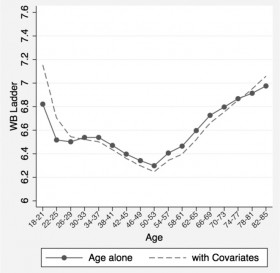Measuring GNH (“Gross National Happiness”)
This evening, when I finished cleaning up the kitchen after our family dinner, I glanced at the current issue of the Economist. The cover features this headline: the Joy of Growing Old (or why life begins at 46). It’s a light read, as this so-influential magazine goes, but nice to contemplate if you’re, say, 50 years old and wondering about the future.
The article’s thesis is this: Although as people move towards old age they lose things they treasure — vitality, mental sharpness and looks — they also gain what people spend their lives pursuing: Happiness.
Fig. 1 (above): “A snapshot of the age distribution of psychological well-being in the United States,” Stone, et al: PNAS, May 2010 (y-axis: “WB” stands for well-being.)
Young adults are generally cheerful, according to the Economist’s mysterious author or authors. Things go downhill until midlife, and then they pick up again. There’s a long discussion in the article on possible reasons for the U-shaped curve of self-reported well-being. Most plausible among the explanations offered, which might be kind of sad except that in reality (as opposed to ideals) I think it’s generally a good thing, is the “death of ambition, birth of acceptance.” The concept is explained: “Maybe people come to accept their strengths and weaknesses, give up hoping to become chief executive or have a picture shown in the royal Academy…” And this yields contentedness. Read more »
*This blog post was originally published at Medical Lessons*












